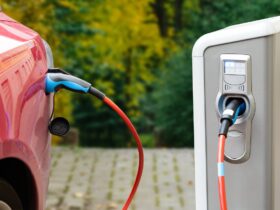Installing an EV charging station at home is a crucial step for any electric vehicle (EV) owner, providing the convenience of charging your vehicle in your own garage or driveway. The process of EV charging installation involves several key considerations to ensure efficiency, safety, and cost-effectiveness. First and foremost, it’s essential to choose the right type of charger for your needs. There are different levels of EV chargers: Level 1, Level 2, and DC fast chargers. For most home installations, a Level 2 charger is preferred due to its faster charging capabilities compared to the standard Level 1 charger. Level 1 chargers use a standard 120-volt outlet, which can be quite slow, while Level 2 chargers operate on a 240-volt outlet, providing a much quicker charge.

The next step in EV charging installation is to assess your home’s electrical system. This involves checking the capacity of your existing electrical panel to handle the additional load of a Level 2 charger. If your panel does not have enough capacity, you may need to upgrade it, which could involve significant additional costs. Consulting with a licensed electrician is crucial at this stage to evaluate your current setup and determine if any upgrades or modifications are necessary.
When planning your EV charging installation, consider the location of the charging station. Ideally, the station should be placed in a convenient spot, such as near your vehicle’s parking area, to avoid long extension cords that can be a tripping hazard and reduce efficiency. Additionally, proper placement ensures that the charging cable can easily reach the EV’s charging port without strain. Your electrician will help you determine the best location based on your home’s layout and your vehicle’s needs.
Another important aspect of EV charging installation is ensuring compliance with local building codes and regulations. Different regions have specific codes regarding electrical installations, and it’s essential to adhere to these rules to ensure safety and avoid potential fines. Your electrician should be familiar with these regulations and will handle the necessary permits and inspections required for the installation.
The installation process itself typically involves mounting the charging station on a wall or a dedicated pedestal, running electrical wiring from your panel to the charging unit, and connecting the unit to your home’s electrical system. This process should always be performed by a qualified electrician to ensure that all connections are made safely and in accordance with electrical codes. Proper installation is vital to avoid potential issues such as electrical fires, which can occur from faulty wiring or improper connections.
Cost is another consideration in EV charging installation. The total expense includes the cost of the charging unit itself, any necessary electrical upgrades, and the labor fees for installation. While the initial investment might seem high, it’s essential to view it as a long-term benefit. Charging at home can be more economical compared to public charging stations, and it provides unmatched convenience.
Finally, after the EV charging installation is complete, it’s important to familiarize yourself with the operation of your new charging station. Most modern chargers come with user-friendly interfaces and may include features such as scheduling, remote monitoring, and real-time status updates. Understanding how to use these features can help you optimize your charging routine and ensure that your vehicle is always ready to go when you are.
In summary, EV charging installation is a key element in transitioning to electric vehicle ownership. By selecting the right charger, assessing your home’s electrical system, choosing the ideal installation location, complying with local regulations, and understanding the costs involved, you can ensure a smooth and efficient setup. Consulting with professionals, such as licensed electricians, is crucial to navigating these steps effectively. With the right preparation and expertise, you can enjoy the convenience and efficiency of charging your EV right at home, contributing to a greener future while maximizing the benefits of your electric vehicle.


















Of course, what a great site and educative posts, I definitely will bookmark your blog.All the Best!
Your point of view caught my eye and was very interesting. Thanks. I have a question for you.